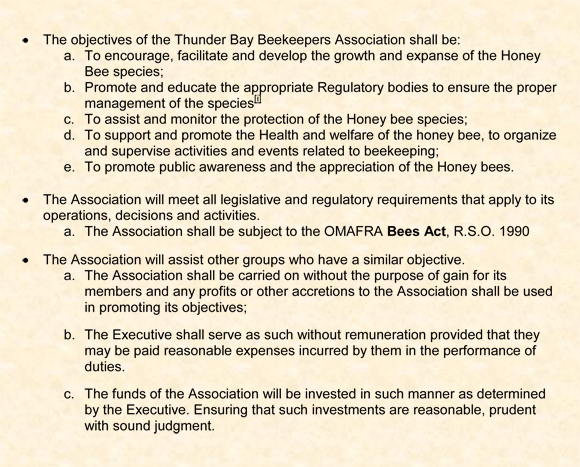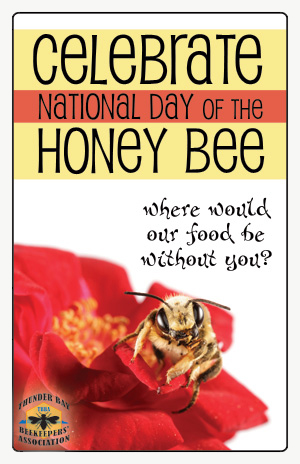Welcome...
Looking for local honey? Email the Association and we'll send you a list of beekeepers who have honey available.

Thinking about getting started in beekeeping?
The following links from the Ontario Beekeeping Association may provide some useful information.- Is Beekeeping for Me?
- FAQs for New Beekeepers
- Legislation You Need to Be Aware Of
- Helpful Resources
- Thinking Organic?
- Workshops & Courses
- Just for fun
- watch More Than Honey: Queen Honeybee Mating Flight
News
Membership application form is available for download.
Annual Membership begins January 1st. -- A reminder to send membership fees ($30- sorry no e-transfers) and application to:1100 Memorial Ave.
Suite #228
Thunder Bay, ON
P7B 4A3
Beekeeping...
If you are considering bees as a hobby or as a sideline business, there are things you will want to keep in mind before making that decision. Since there are many factors involved with making money with the honeybees produce, you might want to start doing it as a hobby.
There is a significant amount of money in the start-up of beekeeping. Before investing any amount of money in your beekeeping project, you might want contact beekeepers in your area. As a rule, they will more than happy to share their experience with you. Most beekeepers love keeping bees and to them it is just a "hobby", but they can give you some insight into beekeeping. Take plenty of notes. More likely than not you will need them. Consider joining the Thunder Bay Beekeepers' Association and participating in the Association facebook group — both avenues will give you access to experienced beekeepers who are willing to chare their knowledge.
In making the decision of becoming a beekeeper, you will want to consider:
- the safety of family, friends, and neighbors. You wouldn't want someone who is allergic to bee stings to get stung! The best course of action on that account is to ask your neighbors and friends, if any of them are allergic to bees.
- finding out if there might be someone who would not like beehives so close to their proximity.
- Checking with the municipality you live in. You will want to know about any ordinances or laws prohibiting beekeeping.
- whether or not you have a location that would be conducive to maintaining bees.
- where the bees will have to fly to retrieve nectar and pollen. Keeping plants they like close by is not a bad idea either.
- That bees need water every day. You might want to have water for them close at hand. You don't want them visiting the neighbor's swimming pool!
- In the area you've chosen:
- How many months of the year will pollen and nectar will be readily available to the bees?
- Will you have to feed them in order for them to survive and how much of the year?
- Is there a water supply available year round for the bees? They need water every day.
- What will be underneath the bees as they fly to get the nectar and pollen they require. The bees will defecate as they are flying and their feces will leave spots on everything below them. The feces can even ruin the surface of a vehicle. There are methods to use to force the bees to fly at a higher altitude, such as a tall fence or thick tall plants near the hive.
- Accessibility -- You want the hives accessible year round. You will want to avoid low spots for your hives because they hold the cold, damp air too long. You will also want to avoid high spots for your hives because that would be too windy.
These are just some of the things you will want to consider before taking on this hobby.
During a nectar flow, many of the older workers will be in the field hunting for food. This is the best time to examine the colony. During the summer more bees will be in the hive and the situation can change, especially between the nectar flows. There can be some robbing going on at this time, which will make the bees even more defensive at any intrusion to their hive. Leaving the colony open for more than a few minutes can accelerate a robbing as can leaving cappings or honey exposed. It will become a necessity to reduce the entrance of a weak colony to prevent stronger hives attempt to rob from it. A honey flow will reduce the likelihood of robbing.
The mood of the bees can have a lot to do with the weather or the time of day. On the days of rainy weather, cool temperatures, early in the morning or late in the afternoon will be more likely to make them angry and they will attack. Always inspect them on warm, sunny days in the middle of the day when most of the bees are foraging.
Keep a constant warm water supply for the bees to cool the hive and dilute honey to feed their young. They will collect water from the closest water source. If you do not have a constant supply of shallow water for the bees, they will look for it somewhere else, like the neighbor's pool, birdbath or wading ponds. The bees are more likely to drown in those sources. If you have a water supply for them when they first fly out in spring, they will not go anywhere else for water. Once they find a water source, it is hard to keep them from going back to it. A beekeeper must keep the bees in control every time the hive is open. A typical hive can house thousands of workers all capable of stinging.
There are measures a beekeeper can take in the open that he can not take in the city because of the closeness of other people. Smoke is the most important tool for the beekeeper opening a hive. Smoke should be used in moderation, but the smoker should be capable of producing large volumes of smoke on short notice. The beekeeper must smoke the entrance of the hive, under the cover, and periodically smoke the frames while the hive is open. Try not to jar the hive or the frames as that may anger the bees, which will make it hard for a beekeeper to do his work. The beekeeper must work quickly and carefully. By going through the frames several times a year, the beekeeper keeps the frames movable. Remove any excess combs. Using gloves when working with bees make the beekeeper clumsier and he may lose control of the hive. The stings that the gloves are protecting you from are easily removed and the pain quickly passes.
These are just some of the tips you will want to consider before taking on this hobby.
Chris
Chris Carolan,
Past-President
Your Association Executive:
![]()
Discussions about beekeeping in the Thunder Bay area happen on the Thunder Bay Beekeepers' Association facebook page. It's a venue that we don't have to pay for! Since we only have 4 meetings a year, we use facebook to chat regularly about our bees. It is a great option for people learning about beekeeping, as there are a number of experienced beekeepers who are willing to share their knowledge. As well, it's just a great place to see what other beekeepers are doing in their yards and sharing information that might be helpful to you. read more...
 Join us on facebook and get to know first about our events, news and outings. This is where the beekeeping discussions are happening between meetings! Read the latest buzz - enjoy!
Join us on facebook and get to know first about our events, news and outings. This is where the beekeeping discussions are happening between meetings! Read the latest buzz - enjoy!
Join the Thunder Bay Beekeepers' Association group at: www.facebook.com
![]()
Many files on this website are in the PDF format and require Adobe Reader to open. To get the free Adobe Reader, click the image below to be redirected to the Adobe Reader download page.


